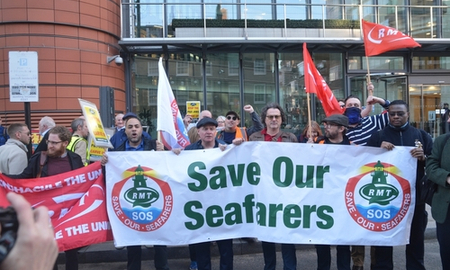Sign up for our free daily newsletter
YOUR PRIVACY - PLEASE READ CAREFULLY DATA PROTECTION STATEMENT
Below we explain how we will communicate with you. We set out how we use your data in our Privacy Policy.
Global City Media, and its associated brands will use the lawful basis of legitimate interests to use
the
contact details you have supplied to contact you regarding our publications, events, training,
reader
research, and other relevant information. We will always give you the option to opt out of our
marketing.
By clicking submit, you confirm that you understand and accept the Terms & Conditions and Privacy Policy
Global capitalism is a funny beast. A few weeks before laying off 800 members of staff claiming without such drastic change there would be no future for P&O Ferries, P&O’s parent company, DP World, posted overall profits of $1.1bn.
But that did not stop P&O chief executive Peter Hebblethwaite being hauled in front of angry UK Members of Parliament (MPs) to explain this apparent contradiction.
Nobody who watched his performance in front of the MPs would describe it as a happy or successful one. Even though he was defending a morally (and arguably legally) indefensible position, his credibility was diminished by how he came across: arrogant, confused, sweaty (never a good look) and over trained in the art of avoiding answering the question.
Why was that? Was it because his position was impossible to defend, or could he have done better at explaining in a more sympathetic and humble way the alleged life and death economic pressures that P&O were facing? Probably…
Equally, could he have prepared and or been prepared more effectively? Probably…
But watching this car crash unfold within the first few questions, another thought occurred to me. A thought that is even more important to the sacked P&O workers and the wider public: are MP’s capable of holding the powerful to account through their questioning at select committees? On that performance I am not so sure.
Defending the indefensible
Dealing first with Hebblethwaite’s actions as CEO of P&O. There is no doubt he was defending the indefensible.
Legally it was indefensible because he sacked his entire staff of thousands without giving them their contractual notice. It was also done in a manner that was in breach of P&O’s contractual obligations of trust and confidence. That is even before you consider the possible legal lacuna about the statutory obligation to consult employees on ships registered in countries with less favourable employment rights.
It was also morally indefensible, to treat loyal, committed and in many cases long standing employees like items on a corporate balance sheet, to be deleted at a click of a button. Stopping there, any CEO would struggle to justify their actions in any arena, let alone before a parliamentary select committee.
But even when defending the indefensible an individual can still come across as serious, measured, reflective, humble and persuasive. Put another way, Hebblethwaite could have done much, much better for P&O and its shareholders.
He would have been better served by understanding that there are some real differences between giving evidence in court and to a select committee of MPs.
Taking the differences first.
- Unlike a judge, or barrister in court, an MP is not a professional questioner. That often shows when witnesses are let off the hook by poorly prepared or rambling questions.
- An MP is often more interested in raising their own profile with the press and social media than getting to the truth of what happened. They invariably don’t listen or react to the answers they have just been given.
- The questioning does not last for very long from each MP, as opposed to the hours and days of questioning from skilled advocates and barristers.
Ultimately it is an easier environment for witnesses than appearing in court. But that doesn’t mean individual and corporate reputations cannot be damaged by the complacency, arrogance and inexperience of the witness.
Golden rules
That means there are still some golden rules to follow, which apply equally to a witness in court.
- Listen to the question to the end of the full stop at the end of the sentence.
- Don’t second guess the question. This means you are not listening to the question.
- Answer the question asked, not the one you wished you had been asked. Answering the question is key to even to a parliamentary select committee. Most senior corporate executives believe their media trained answers will deflect attention.
- Avoid long-winded and self-serving answers.
- Don’t pretend to be someone you are not. Most of us remember Rupert Murdoch’s quiet and respectful air and the “most humble day of his life” during MP’s questions about phone hacking. That can be contrasted with his public appearances and some pretty belligerent and feisty testimony at the Leveson enquiry.
Hebblethwaite's performance
So, applying these golden rules, how did Hebblethwaite do? You could see he was nervous, all of us would be. Perhaps there was nothing he could do about his sweaty head, apart from perhaps taking his jacket off. However, as someone who has cross-examined thousands of witnesses there is a lot more he could have done to prepare himself effectively.
First, someone should have told him before about his distracting habit of his thumbs touching each other when being asked a difficult question.
Secondly, someone should have told him the best way to get through difficult questions is to listen to the full stop at the end of the question and then do your best to answer the question asked, not the one you or your media handlers have trained you to answer.
His first answer was a case in point. Channelling his inner Rupert Murdoch on the “most humble day of his life”, he didn’t answer the first question at all, simply stating: “Before I answer that question can I start, please, with an apology? An apology to the seafarers who were affected on Thursday last week, an apology to their families, and an apology to the 2,200 of our employees.”
I doubt the 2,200 employees viewed that apology as a genuine one, but by not answering the question asked, he got off to the wrong start, looking evasive to the audience and annoying his questioners.
Rambling answers
Thirdly, in addition to answering the questions asked, did no-one tell him that long, rambling answers do the witness no favours?
Take this question from the chair of the select committee Andy McDonald: “You chose to break the law?” The answer to that question is: “Yes.” That then makes the questioner work harder for the next question, ie. which law? Hebblethwaite instead replied: “We chose not to consult, and we will compensate everybody in full for that.” That’s several answers to a question that was not asked.
A further example of this was the answer to another question from McDonald: “That's below the national minimum wage of this country. How do you reconcile that?”
Hepplewhite answered that the wage was “competitive”, adding: “Where we are governed by national minimum wage, we will absolutely pay national minimum wage. This is an international seafaring model that is consistent with models throughout the globe and our competitors.”
Again, the answer to that question was: “No, we pay the national minimum wage.” That’s enough. There is no need for self-justificatory fluff about “competitors” and the “international seafaring model".
Ultimately, defending unlawful and morally reprehensible corporate conduct is always going to be beyond the competence of most senior executives, but if they bear in mind the above, they might get away with not completely trashing their own and their company’s reputation (and stock price…).
MPs' interrogation skills
But then you come onto the quality of the questions asked by MPs. Some of the questions asked were equally as depressing as Hebblethwaites’ answers and performance.
Take Darren Jones MP's first question? “Are you in this mess because you don’t know what you’re doing, or are you just a shameless criminal?”
As a statement designed to get media attention it works, but as a question it is poor. First, it doesn’t appear that a criminal offence has been committed, it also lets the witness of the hook. Your first question sets the tone for whether you will unsettle or relax the witness; like most things in life the start really matters. You don’t see any murder trials start with “you killed your wife”, apart from some dated 1970s crime drama.
Building blocks
You use building blocks to methodically trap and expose a witness. You don’t call them a criminal in the very first question. It allows a witness to relax and realise that it is a pantomime they have been invited too, not a serious inquisition into their conduct.
A better start would have been: “Mr Hebblethwaite, you breached your employees’ contracts of employment by failing to give their notice and notice pay didn’t you?” To which the answer had to be: “Yes.”
Then: “You failed to consult with your employees at all about their dismissals didn’t you?" To which the answer also had to be: “Yes.”
Then: “By failing to give them their contractual notice and consult with them meant you acted unlawfully didn’t you?” The answer again is: “Yes.”
Then: “Did you knowingly breach the law (or act unlawfully)?” To which the answer is going to be: “Yes.” Then you can say he is a “shameless law breaker”.
Or, if the answer is “no”, then the follow up would be: “As a CEO of a major PLC your evidence is that you didn’t know whether you acted lawfully or not? As CEO you should know what is lawful or not, shouldn’t you? A CEO who doesn’t know what is lawful or not is not a competent one, isn’t that right?” Then you would follow up with: “So on your own case you are incompetent at your job.”
Either route allows the questioner to expose the witness as either incompetent or callous. Either works.
Pressure
With small building blocks you maintain the pressure on the witness continuously by controlling them with the questions until you get to your killer point.
But it wasn’t confined to just one MP. Andy McDonald MP on the issuing of non-disclosure agreements (NDAs) to workers: “The members of this committee think this is absolute thuggery and criminality.”
Leaving aside the fact that this is a statement, not a question, thuggery is beating someone up, intimidating and harassing them; not subjecting them to an NDA. Also, what the questioner thinks is neither here nor there. Like answering the question for the witness, there are some golden rules for questioners, MPs or otherwise:
- Know what the answer is before you ask the question.
- Ask a question, don't make a statement.
- Only ask one question at a time. A rule of one sentence for a question is a good one.
- Use building blocks.
- Listen AND react to the answer.
- Use charm and reasonableness.
A brilliant example of charm and reasonableness is the former Australian Labour senate leader, John Faulkner, who would start questions with a reasonable proposition, put reasonably, that sought agreement from the witnesses. If you can get the witness to answer “yes” a lot, it becomes a struggle for them to start disagreeing with you.
MPs should ask themselves what the purpose of questioning witnesses at a select committee is. Is it to gather evidence and hold the powerful to account through good questions, or is it about dramatic and newsworthy statements?
If it’s the former they need to work harder at doing it effectively.
Ed Williams QC is the co-founder of Assurety, the leading witness preparation company as well as being a specialist employment barrister at Cloisters chambers and listed in the legal directories as an expert in his field.
Email your news and story ideas to: [email protected]





